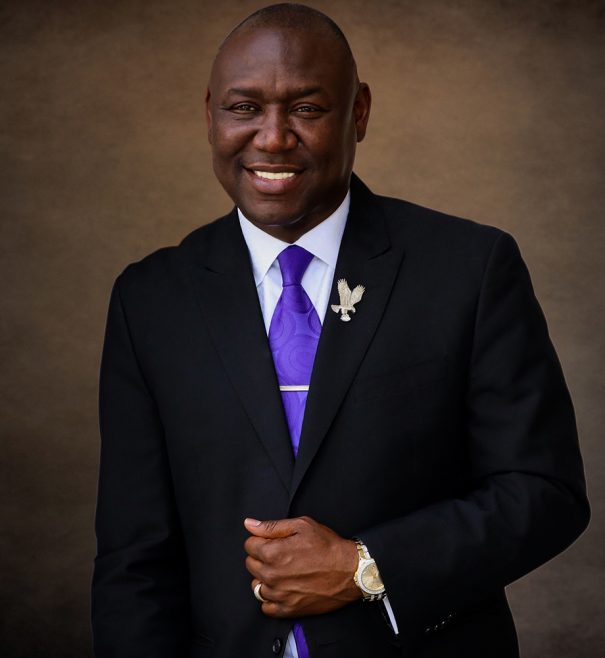Warrior for Justice: The Footprint of Attorney Benjamin Crump
“Home is where the heart is, and my heart is in Tallahassee.”
Tallahassee is at the seat of the Civil Rights Movement and Black culture today. It hosts a legacy of heroic figures who have made strides to demand equal rights and continue to make Black history. Here is a look at one of Tallahassee’s most elite leaders and changemakers. His impact on history has sculpted the future of Tallahassee and the nation. Celebrate his legacy by visiting attractions and historic monuments associated with Black culture, and getting involved in educational programs and special events that celebrate Black History during the month of February and every day year round.

The iconic Benjamin Crump is an undisputed leader for racial equality and a renowned trial lawyer for justice. With over 25 years of experience practicing law, Crump has won over 200 cases related to police brutality. His tireless work to ensure that marginalized members of society are protected by the law has led to legislation preventing excessive force and developing implicit bias training and policies. While Attorney Crump has become one of the most well recognized names and faces in civil rights—to the city of Tallahassee, he is a native son, a Seminole at heart, and a man uninterrupted in his pursuit of justice for all.
Born in Lumberton, North Carolina, Ben was raised by his dedicated mother in a single parent household. While she worked two jobs to cover the family’s expenses, Ben developed a perspective that shaped his career. As a young boy, he marveled at the stark differences in his community, noting that individuals in some parts of his hometown lived well, while others were economically challenged. This was apparent in his early education at a segregated public school.
In the fifth grade, Ben transitioned to a former whites-only school where he saw a higher standard of books and resources. His mother explained that the change he experienced was because of a man named Thurgood Marshall—a lawyer who challenged the constitutionality of school segregation. This culminated in Brown v. Board of Education, the landmark Supreme Court decision that ruled that racial segregation of children in public schools was unconstitutional.
Thurgood Marshall became Ben Crump’s hero and to this day, refers to him as his north star. At nine-years-old, Ben decided to follow in his hero’s footsteps and vowed to become a lawyer that fights for people in the community. He never lost sight of that dream. “When we stand up for the least of these, what we are really doing is helping America live up to its creed of being a beacon of hope and justice for all the world to see,” Attorney Crump said. “But more importantly, we are helping America be America for all Americans.
As a teenager, Ben moved to Fort Lauderdale where he attended South Plantation High School before moving on to Florida State University (FSU). He earned a bachelor’s degree in criminal justice in 1992 and a Juris Doctor from the FSU College of Law in 1995. There, he met his future law partner, Daryl Parks.
“Fate happens—I think God ordains our destiny,” Attorney Crump said. “I never thought that I’d end up living in Tallahassee, but when Daryl and I got out of law school, we turned down all of our job offers elsewhere because we wanted to help the people in this area.” According to Crump, the Tallahassee landscape offers unique traits that add to individuals’ propensity for success. “We knew that Tallahassee was a good community, but I don’t think we fully understood how blessed we were to be here at the time. Tallahassee is ranked as one of the most educated cities in America, it has a high percentage of diversity, it’s culturally inclusive and the colleges in town breed a sense of optimism, hope and potential.”
When reflecting back on the timeframe that he and Daryl opened their first practice, Parks & Crump, and the trajectory their careers have taken since that time, Crump says that Tallahassee was always in their corner. “The spirit of Tallahassee, the people, the endless possibilities of what life could bring and what we could bring to it, supplied the wind beneath our wings,” Attorney Crump said. “As we continued to ascend in our careers, it was always Tallahassee propelling us to the next level. That is why I love Tallahassee, and to me—that is why it will always be home.”
Widely known as an advocate for social justice, Attorney Crump is furthering his vision for racial equality by working intensely as a civil rights attorney. He uses heartfelt speeches as an outcry for the voiceless, gaining media attention and garnering public support of cases that are often times overlooked. This was seen in his plea for justice for individuals impacted by the Flint, Michigan water crisis, the deaths of Trayvon Martin, Ahmaud Arbery, Breonna Taylor, and unfortunately, many more victims whose names are etched in our memories.
In 2020, Crump took on the George Floyd case where he successfully brought the Floyd family justice. The city of Minneapolis agreed to a $27 million wrongful death settlement to the Floyd family. This is the largest pretrial civil rights settlement ever. On April 20, 2021, in a historic verdict, former Minneapolis police officer Derek Chauvin was found guilty on all charges for killing George Floyd by pressing his knee onto Floyd’s neck for more than 9 minutes as he lay on the pavement face-down while handcuffed. Chauvin was sentenced to 22.5 years.
The bevy of high-profile cases Crump has taken on are just a small measure of the man coined, Black America’s Attorney General. “My passion for civil rights was developed at a young age, but I’d be remiss if I didn’t think it was harnessed while I was a student at FSU and served as president of the Black Student Union,” Attorney Crump said. When he recalled being admitted into FSU’s law school, he shared that it was the many mentors and influencers he encountered as a student whose belief and encouragement prepared him for his own seat of influence.
“I was prepared to leave Tallahassee to attend Howard, or North Carolina Central University for law school, but Talbot “Sandy” D’Alemberte—the 12th president of Florida State University and fourth dean of its College of Law—said to me, ‘We can’t lose our brightest talent.’ He told me that I would do important things in the world and encouraged me to stay at FSU so that they could prepare me for the future.”
Along with the late President Emeritus D’Alemberte’s supportive statements, Crump holds memories with numerous individuals who taught him lessons that could not be learned by affiliation or within the confines of the classroom. “We had supportive people that stood behind us like John Marks who became Mayor of Tallahassee; the late Dr. Frederick Humphries—the 8th president of Florida A&M University (FAMU); Dr. Melvin T. Stith—Dean Emeritus of FSU’s College of Business; Dr. Freddie Groomes-McLendon, the first Black and first woman administrator of FSU’s executive council; Dr. Sandra Rackley, FSU’s former Dean of Undergraduate Studies, Dr. Na’im Akbar—distinguished scholar of African American Studies; and Rev. Dr. RB Holmes, Jr., pastor of Bethel Missionary Baptist Church—to name a few,” said Attorney Crump. “Some people were built to fail, but it was the opposite for us in Tallahassee—we were built to succeed from the moment we got here.”
Crump recalls a profound experience where he came to recognize our inherent responsibility to ensure that individuals who have been marginalized have a voice that is heard. “The late Dr Humphries sat on the Board of Directors for Wal-Mart, Inc., and while Daryl and I were still in law school, he took us to a board meeting with the richest man in the world at that time, Sam Walton himself,” said Attorney Crump. “Dr. Humphries introduced us as great future attorneys and sat us at the general counsel’s table, and unapologetically. It was his way of showing us that we have every right to be included and every right to have a seat at the table.”
Crump says this experience was an opportunity for him to learn and gain exposure, but it also taught him about life and the purpose behind the position he is in today. “Dr. Humphries believed that we belonged, and because of that—we started believing we belonged too,” said Attorney Crump. “The lesson we must continue to teach our young people—especially Black young people, is that we have a right to everything any other American has a right to. We are the answered prayer of our ancestors, the hope of the slave, and the liberation for those who had to run from the lynch mob.”
Even in light of his success and wealth, Attorney Crump lives in a modest community on the south side of Tallahassee with his long-time wife, Dr. Genae Crump and daughter, Brooklyn. “I love the balance that the city of Tallahassee has to offer, but I am relentless about my southside pride,” Attorney Crump said. “We go to Cascades Park to jog and practice volleyball, and I’m very happy that the leaders of Tallahassee made sure that children on the south side can walk to the park from their homes.”
One of the greatest features the city has to offer, according to Crump, is that Tallahassee has everything you need to raise a family. “You can feel good about it being an educated community while not being overly concerned about crime, and also being able to see the inner workings of government at a birds-eye view,” said Attorney Crump. “We have so many events and attractions year-round, from FSU and FAMU’s homecoming to FSU’s Unconquered statue and FAMU’s Eternal Flame. We are home to the first historic Black neighborhood in the panhandle—Smokey Hollow, which is where Cascades Park now sits and was the former home of Wally Amos, founder of ‘Famous Amos’ cookies. We have jewels in The John Gilmore Riley Center & Museum for African American History & Culture, FAMU’s Meek-Eaton Black Archives Research Center & Museum, and the Knott House Museum where the 157th reading of the Emancipation Proclamation was read last year. You can be in Tallahassee and get a generous amount of culture on any given day.”
While Crump is a self-described finnicky eater, he has some favorite places to dine, especially with his family. “Brooklyn and I enjoy the extra effects of sparkle and fire when we dine out, so we enjoy eating hibachi from our favorite restaurant, Osaka Japanese Hibachi Steakhouse & Sushi Bar,” Attorney Crump said. “We also enjoy The Edison and some of my favorite spots on the south side like Earley’s Kitchen and Olean’s Café—which could compete up against any other as the best soul food restaurant in the world.”
Along with fine cuisine, sites and attractions, Tallahassee also preserves the history of Civil Rights and progressive movement in Florida. Since its original founding in 1870, Crump’s church-home, Bethel Missionary Baptist Church and then pastor, Reverend C.K. Steele gave heroic and significant leadership to the Civil Rights Movement. In the 1950s and 60s, Steele and the congregation spoke out against disparities and took a leading role in organizing and activism. Steele was a friend to Martin Luther King, Jr., John Lewis, and Andrew Young. He participated in the Tallahassee Bus Boycott, The March from Selma to Montgomery, numerous sit-ins and has a statue that stands near the Greyhound Bus Depot. Since 1986, Bethel has been under the pastoral leadership of Crump’s longtime friend and clergyman, Rev. Dr. RB Holmes, Jr.
“If it wasn’t for the Black history that happened right here in Tallahassee, we wouldn’t be where we are today,” said Attorney Crump. “Carrie Patterson, Wilhelmina Jakes, and Arthenia Joyner were arrested as FAMU students for refusing to give up their seats during the bus boycott. Joyner went on to become the first Black female Senate Democratic leader. Fred and Doby Flowers were the first Black students to attend FSU, and they didn’t just integrate without forward action—FSU became the first university in the south to have Black fraternities, sororities, and athletes.”
When speaking toward the living legacy of Black history today, Crump recalled the words that Dr. Na’im Akbar shared with him many years ago. “You have a responsibility to speak truth to power when you have been given the opportunity to do so. You cannot be bashful.” said Attorney Crump. “Young people will have a better or worse world because of our actions or inactions. Our legacy is one that we must always let our children know that we will speak up, stand up, and fight for their future so that the next generation has an equal opportunity at the American promise of life, liberty and the pursuit of happiness.”
Attorney Benjamin Crump was named one of the Most Influential People of 2021 by Time 100, The National Trial Lawyers Top 100 Lawyers, Power 100 Most Influential African Americans, and INFLUENCE Magazine’s Most influential People in Florida Politics. He is a lifetime member of Omega Psi Phi Fraternity, Inc. and the founder and principal owner of Ben Crump Law. His dedication to justice can be seen in the Netflix documentary, ‘Civil.’
Prepared by Jessica Lumpkin, MBA


